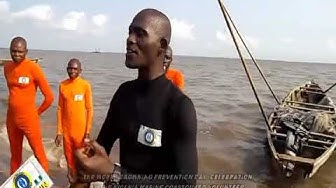The Nigeria Marine Coastguard Volunteer Service (NMCGVS) has emphasised the urgent need for coastal states, educational institutions and individuals to prioritise water safety measures.
Speaking at a recent seminar on water safety, the Chief Commanding Officer/founder of NMCGVS, Captain Isaac Adamolekun, said it is imperative to create a safety framework to address the rising drowning incidents in boat mishaps and flood emergencies across coastal and riverine states.
He said lack of water safety readiness and awareness is a critical issue that needs immediate attention as drowning incidents and flooding continue to claim lives.
Adamolekun outlined the various hazards associated with water including strong currents, submerged objects, and biological pollutants while stressing the importance of understanding these risks and taking preventive measures.
He said water safety is not just about knowing how to swim, but about being prepared for emergencies and understanding the environment.
Adamolekun highlighted the concept of water safety, focusing on procedures, precautions, and policies to ensure safety in, on, and around bodies of water.
He advocated for the development of Community Water Safety Plans (CWSP), urging local communities to engage in proactive measures to protect their residents.
Adamolekun highlighted the key components of a CWSP to include, engaging the community, assessing local water environments, identifying hazards, and implementing improvement plans.
He said a community-led plan is the first step in water safety, saying to know your community best can help protect those who are most vulnerable.
He also outlined the broader goals of the NMCGVS, which include establishing a national network of professionally trained water safety and rescue teams.
According to him, this initiative aims to foster collaboration with community, local, state, and federal government organisations to create a comprehensive water safety framework across Nigeria.
Adamolekun further emphasised the importance of basic water survival skills, supervision, and the use of life jackets.
He encouraged communities to educate their members about water hazards and teach basic life support skills.
